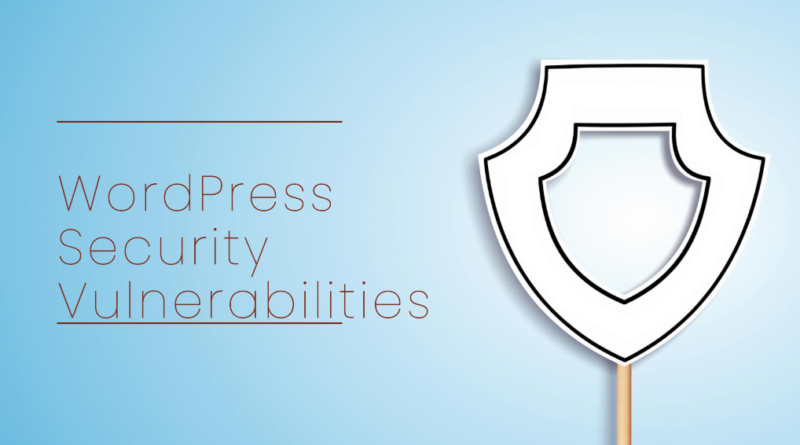WordPress Security Vulnerabilities to Watch Out For
WordPress security vulnerabilities are the security loopholes that provide access to hackers into the internal systems. In some cases, hackers use various attacks to trespass the weak security measures. In other cases, sites have no security measures at all and hackers are free to misuse them.
Identifying all such potential issues and fixing them is the only way to protect sites from cyber-attacks. Strong and reliable hosting service, along with strong user permissions and two-factor authentication are the basic steps you can take. Exploring vulnerabilities in detail can enlighten you about more necessary actions.
Scroll into the details of this article to get your hands on WordPress security vulnerabilities you need to watch out for and opt for the right solutions to optimize site functioning.
Top 6 WordPress Security Vulnerabilities You Must Resolve
WordPress security vulnerabilities significantly facilitate cybercriminals in achieving their malicious goals. Some of the vulnerabilities occur due to human negligence, so you need to be more vigilant and take necessary actions on time.
Here are the most common WordPress security vulnerabilities you must be aware of and resolve efficiently for smooth WP functioning.
1. Outdated Software
Outdated software is the foremost WordPress security vulnerability you must watch out for. WordPress rolls multiple updates every now and then to patch software and resolve security concerns. Instead of ignoring these updates, you must install them immediately.
The software updates will ensure it has the latest security version which is free of potential vulnerabilities. It will denounce all the hacking attempts of hackers and boost the overall security of your software and site. On the other hand, outdated software is nothing less than an open invitation for hackers, so install the updates frequently.
2. Malware
Malware is the next major WordPress security vulnerability that you need to watch out for. Hackers often use malware attacks to infect websites and confidential data to steal or gain internal access. The hackers might inject malware into your site and not act on it immediately but wait for a specific time.
In other words, the files, folders or database may have malware that you are unaware of. You can regularly conduct security scanning to identify and remove potential malware. On top of this, you must install security firewalls and take other measures to filter out malicious traffic.
3. Poor Hosting Environment
Poor hosting environment is the next major WP security vulnerability that you must handle carefully. Opting for a random hosting service with a poor reputation is definitely going to affect your site negatively. On top of this, if you opt for a poorly managed shared hosting plan, you will become an instant target of cybercriminals.
Therefore, choosing a secure and reliable hosting plan is crucial for overall WP security and smooth functioning. You must check the reputation of the hosting providers and ensure round-the-clock customer support. You can consult secure WordPress hosting UAE services and opt for a managed and secure plan to run your operations smoothly.
Read also: cPanel Web Hosting Tools for Website Management
4. Poor Control of User Permissions
Poor control of user permission is one of the most significant WordPress security vulnerabilities that you need to watch out. It is more specifically a mistake on the part of the site owners who fail to implement proper user control measures.
Every other person should not have access to the confidential data of your site or the admin account. It means the security is weak and hackers can easily trespass the weak security to gain access to confidential data. You must implement strong user permission protocols and only grant access to the admin and other key authorities.
5. Outdated Plugins and Themes
Outdated plugins and themes are another common WP security vulnerability that you can resolve easily. Most WordPress site owners keep installing more and more plugins to facilitate certain functions and overall functioning. However, it is not a commendable practice. You must uninstall the plugins that are not in use or required anymore.
Not uninstalling them will offer an opportunity for cybercriminals to misuse them. Besides this, you must frequently update the plugins and themes in use to boost their security. It will ensure they do not facilitate hacking attempts and just optimize the functioning of the site.
6. Lack of Two-Factor Authentication
The Lack of two-factor authentication is the last WordPress security vulnerability you need to prepare for. Instead of using a simple and easy-to-crack password for your WordPress account, you must implement two-factor authentication.
The hackers can easily gain access to only password-protected accounts by using brute force and other types of attacks to guess your password. After that, they will access the account to steal data or carry out other malicious activities. Using long and complex passwords with two-factor authentication will significantly boost security, so implement it efficiently.
Read also: Website Improvement Techniques by Website Designers
Take active measures and resolve WordPress security vulnerabilities!
You cannot optimize WordPress security without a reliable hosting plan, no matter how many security layers you implement. So, choosing the right hosting plan and reliable provider and ensuring all other security implications to boost site security and functioning.

